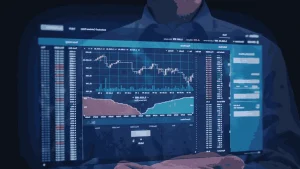Navigating Forex Trading Losses in South Africa
The South African forex trading landscape presents unique challenges within the context of an emerging market economy. Despite the growing accessibility of trading platforms, many South African traders encounter significant obstacles when attempting to generate consistent profits. Understanding these challenges within the local context is crucial for developing effective trading strategies.

Critical Factors Affecting South African Traders
Economic Variables
The South African economy’s distinctive characteristics significantly impact forex trading outcomes. The volatility of the Rand (ZAR), influenced by both domestic and international factors, creates a complex trading environment that requires specialized knowledge and careful consideration.
Key economic influences:
- South African Reserve Bank policies
- Mining sector performance
- Political stability impact
- Global commodity prices
- International trade relations
- Local inflation rates
- Foreign investment flows
Market Accessibility Challenges
Trading infrastructure and regulatory requirements present unique obstacles for South African traders:
Essential considerations:
- Exchange control regulations
- Cross-border transaction limits
- Platform accessibility issues
- Trading hour constraints
- Broker selection criteria
- Regulatory compliance
- Transaction cost implications
Operational Environment
| Aspect | Challenge | Impact Level |
| Internet Connectivity | Trading disruptions | High |
| Power Supply | Platform access | Critical |
| Banking Systems | Fund transfers | Significant |
| Market Access | Trading execution | Medium |
Strategic Trading Development
Skills Enhancement Framework
South African traders must develop specific competencies aligned with local market conditions:
Knowledge Development Path:
- Regulatory understanding
- Local market dynamics
- International correlation
- Risk assessment skills
- Technical proficiency
- Fundamental analysis
- Currency pair expertise
Implementation Process:
- Market research
- Strategy development
- Risk framework setup
- Small-scale testing
- Performance evaluation
Risk Management Protocol
| Protocol Element | Implementation | Priority Level |
| Capital Protection | Maximum 2% risk rule | High |
| Position Sizing | Market volatility based | Essential |
| Currency Exposure | Diversification focus | Critical |
Psychological Mastery for South African Traders
The unique pressures of trading in an emerging market require specific mental preparation:
Market-Specific Considerations:
- ZAR volatility adaptation
- Global market impact awareness
- Local market timing
- Economic news response
- Risk tolerance assessment
- Portfolio balance
- Crisis management preparation
Performance Enhancement Tools:
- Performance analytics
- Decision logging
- Market scenario planning
- Stress testing strategies
- Peer collaboration
- Professional development
- Risk assessment tools
Market Analysis Framework
Technical Proficiency Requirements
Successful trading in the South African market demands specialized technical knowledge:
Core competencies:
- Local market indicators
- Global correlation analysis
- Currency pair dynamics
- Volatility measurement
- Trend identification
- Risk assessment tools
- Market timing strategies
Success Framework
To thrive in the South African forex market, traders must:
- Develop robust contingency plans
- Build strong technical foundations
- Maintain strict risk management
- Understand local market dynamics
- Create reliable backup systems
- Establish clear trading protocols
- Monitor global market impacts

Risk Assessment Matrix
| Risk Category | Assessment Criteria | Mitigation Strategy |
| Market Risk | Volatility levels | Position sizing |
| Currency Risk | ZAR exposure | Diversification |
| Systemic Risk | Market stability | Hedging strategies |
FAQ
How does the South African economic environment affect forex trading?
The local economy’s reliance on commodities and sensitivity to global markets creates unique trading conditions requiring specialized strategies.
What are the key regulatory considerations for South African forex traders?
Traders must navigate exchange control regulations, SARB requirements, and international transaction limits.
How can I manage risks specific to the South African market?
Implement strict position sizing, maintain awareness of ZAR volatility, and develop comprehensive risk management protocols.
What technical skills are most important for local market success?
Focus on understanding local market indicators, global correlations, and ZAR-specific trading patterns.
How does load shedding affect forex trading in South Africa?
Power supply issues require backup systems and careful trading schedule management to maintain consistent market access.













